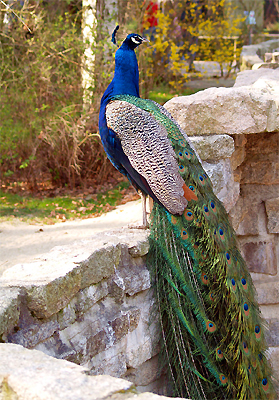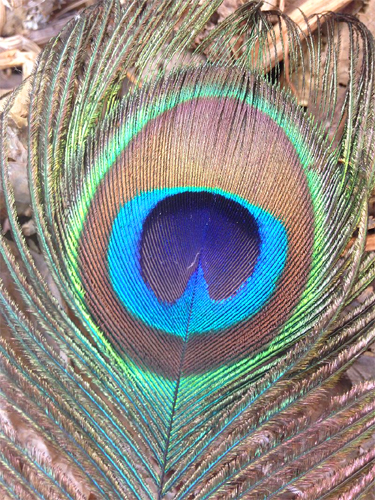In olden times, bird feathers were worn by girls as adornment. People believed that they warded off evil spells, ill-fated encounters, sorcery and wicked spirits. The feathers of certain birds were particularly potent – whether birds in the wild or domesticated birds. Pride of place is accorded to the male peacock and its beautiful plumage. During the mating season, he spreads out his tail in a perfect semicircle. As a matter of fact, the peacock’s tail is no different from the tail of his more commonplace next of kin (hens, for example). The dazzling fan is actually made up of the so-called dorsal or upper tail feathers, which differ in length and colouring. The way they are arranged is truly amazing. When the peacock spreads them, the longest feathers remain at the back, with the shorter plumes on top and to the side. There are all kinds of peacocks, even white ones. But the rainbow blue-green hues with a darker patch, known as an eye are what have made the India Blue Peacock so popular.
 Peacocks are rare birds, even nowadays when they live in different weather conditions around the world. Peacocks originally came to this country, and to the whole of Europe from Central and Eastern Asia. In India, for example, they are a common sight, there they live in forests, meadows with tall grass close to towns and villages. Peacocks are one of the symbols of the Hindu God Krishna, their feathers once adorned the head of the Lord of the Universe, as the ancients called him. In modern India, peacocks are revered as godlike creatures, and hunting them is prohibited.
Peacocks are rare birds, even nowadays when they live in different weather conditions around the world. Peacocks originally came to this country, and to the whole of Europe from Central and Eastern Asia. In India, for example, they are a common sight, there they live in forests, meadows with tall grass close to towns and villages. Peacocks are one of the symbols of the Hindu God Krishna, their feathers once adorned the head of the Lord of the Universe, as the ancients called him. In modern India, peacocks are revered as godlike creatures, and hunting them is prohibited.
In many Bulgarian homes one or more peacock feathers are prominently displayed to this very day. They are made mention of in folk songs, tales and superstitions. It is believed that peacock feathers bring good luck, happiness and keep evil at bay. Unlike the plumage of other birds worn by unmarried girls, peacock feathers were part of the wedding attire. People used to call peacock feathers lazarochki - in some parts they are worn by the girls who sing and dance on St. Lazarus day (lazaruvane), as attested to by the lyrics of songs accompanying this spring maiden ritual. In Bulgaria, there is a male and female name – Paun and Pauna (peacock, peahen).
 “To see a peacock in your dreams is a good thing. To catch a peacock means a young man shall ask for a girl’s hand in marriage, or the girl shall elope with him and that too is a good thing. If the girl wears a peacock feather – that is a good thing, she shall soon receive a marriage proposal” – reads the Bulgarian folklore dream-book.
“To see a peacock in your dreams is a good thing. To catch a peacock means a young man shall ask for a girl’s hand in marriage, or the girl shall elope with him and that too is a good thing. If the girl wears a peacock feather – that is a good thing, she shall soon receive a marriage proposal” – reads the Bulgarian folklore dream-book.
“Peacocks are not poultry, yet they used to be bred a great deal because they play such an important role in popular belief and folk songs,” writes Dimitar Marinov, a researcher of Bulgarian tradition from the turn of the 20th century, a time when traditional rituals were practically intact. As he puts it, peacocks were reared at boyar estates, hence the expression: “To strut like a peacock in boyar gardens,” that is frequently used in Christmas benedictions.
Peacocks were rare in our lands, so their feathers frequently had to be bought. “Fine grass growing, peacock grazing. His feathers dropping, lasses picking them up to make posies. Posies going for a thousand, a feather for one hundred,” goes a song from Nevrokop near Gotse Delchev. Songs about peacocks are also sung at weddings – “a bird that is fair, a bird that is regal”. The groom is often compared to a peacock, the bride – to a peahen: “A peacock coming, leading a peahen.” There also exist expressions such as: “As handsome as a peacock”, “As dressed up as a peacock”, but also “Showing off as a peacock does his tail.”
English version: Milena Daynova
The Philip Koutev National School of Folk Arts is not just any school - it is a talent laboratory. It is the first school not only in Bulgaria but in the Balkans for professional study of folklore. It is located in the heart of the beautiful town of..
Scientists from the Sorbonne will study the cultural heritage preserved in the Regional Ethnographic Open-Air Museum "Etar" , informs public broadcaster BNT. In March this year the French scientists together with experts of REOM "Etar" will study elements..
The day of St. Tryphon (1 February old style, 14 February new style) is celebrated by vine growers, falconers and gardeners in Bulgaria. Trifon Zarezan comes around with vine pruning and wine drinking St. Tryphon is believed to help..

+359 2 9336 661
